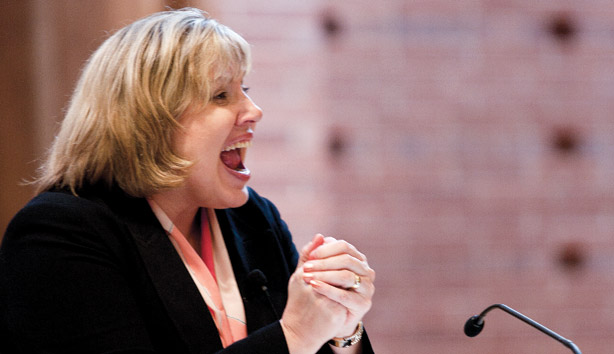The Bible & Theology Toward Christian Maturity
Conference Sheds Light on Teenage Faith
Practicing Passion
By Kathy Henning (kathy@spu.edu) | Photo by Perry Azevedo/The Falcon

Doug Strong, dean of the SPU School of Theology and professor of the history of Christianity, calls Kenda Creasy Dean "probably the leading voice in theology and youth ministry in our country today."
What's the biggest factor that keeps young people from connecting with church? Strict rules? Cultural irrelevancy?
No, says Kenda Creasy Dean. It's "benign whateverism," a prevalent attitude of indifference toward faith.
This viewpoint was first named and described in Soul Searching: The Religious and Spiritual Lives of American Teenagers, the 2005 book by Christian Smith and Melinda Lundquist Denton '96 that reported the findings of the landmark National Study of Youth and Religion.
But the attitude of "benign whateverism" continues to be a critical issue, says Dean, founding director of the Princeton Theological Seminary Institute for Youth Ministry, and author of several books on youth ministry, including Almost Christian: What the Faith of Our Teenagers Is Telling the American Church (Oxford, 2010).
"When young people dismiss Christianity, we need to listen closely," she says. "Because underneath their whateverism is a plea that goes something like this: 'Please, please, tell me what you say is true. Tell me someone loves me so much that they won't go away and they won't let me down and they won't let me go.'"
As the keynote speaker for "Passionate Faith," the inaugural conference of Seattle Pacific University's new Center for Biblical and Theological Education, Dean spoke to more than 250 local youth ministers, youth workers, and other church leaders in May 2010 about how churches can encourage and educate teenagers in meaningful, life-changing ways.
"When the church doesn't give teenagers a story of God's salvation, teenagers will gladly find a salvation story someplace else," she told the church leaders, citing examples from TV and movies such as Twilight, Heroes, Smallville, Glee, and Gossip Girl as alternate salvation stories.
The job of parents, youth leaders, and the church, she said, "is to help young people imagine the world as though the kingdom of God is at hand. Make no mistake: If we don't actively cultivate this kind of imagination — a way of being in the world that echoes the kingdom of God — we will default to other ways of imagining the world."
In addition to Dean's presentations, conference attendees gathered for contemplative worship and a plenary address from Romanita Hairston, vice president for U.S. programs for World Vision, who spoke about "Reimagining the Role of Youth in the Kingdom of God." She encouraged church leaders to "stand firm on the issues of justice, and engage young people in the work of 'doing justly,' as Micah says, of making right the injustices of the world."
SPU's School of Theology and local parachurch organizations also offered breakout sessions for the church leaders.
A session on biblical illiteracy led by Associate Professor of Theology David Nienhuis was a highlight for Steve Scott, family ministries team pastor at Wenatchee Free Methodist Church. "He (Nienhuis) simply shared with us the rampant biblical illiteracy that he observes among the freshmen in his classes, that many teens simply don't read the Bible for themselves and rely largely on what they've been told about the Bible," Scott says.
As church leaders such as Scott work to make their ministries more effective to young people, Dean encourages all Christians to see themselves as youth ministers. "We have to stop equating youth ministry with a job description," she says. "Parents and other adults in congregations need to recognize that they shouldn't have a hands-off attitude about young people's faith."
